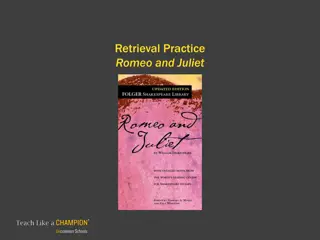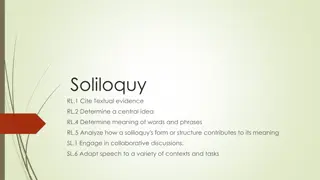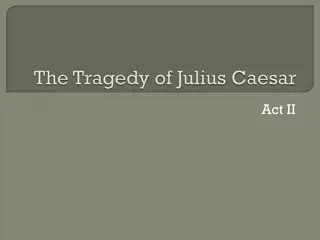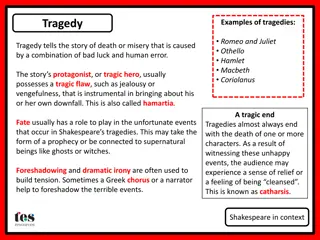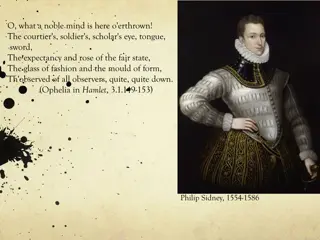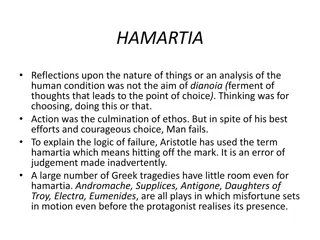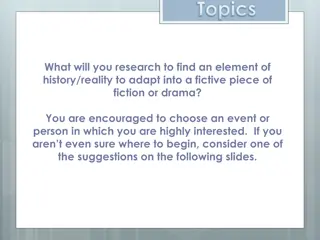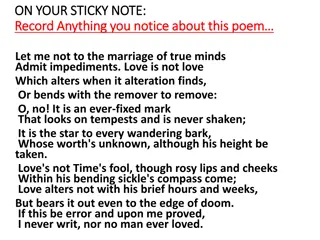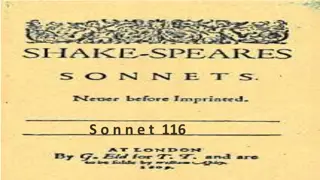Insights into Characters in Shakespearean Tragedies
The witches in Macbeth set a tone of foreboding and deception with their choral lines, while Lady Macbeth is portrayed as ruthless and driven by ambition. Macbeth struggles with the consequences of regicide, and Lady Macbeth descends into guilt-induced madness. In contrast, Juliet in Romeo and Juliet expresses her love for Romeo despite the family feud. These iconic characters explore themes of ambition, guilt, and forbidden love in Shakespearean tragedies.
Download Presentation

Please find below an Image/Link to download the presentation.
The content on the website is provided AS IS for your information and personal use only. It may not be sold, licensed, or shared on other websites without obtaining consent from the author. Download presentation by click this link. If you encounter any issues during the download, it is possible that the publisher has removed the file from their server.
E N D
Presentation Transcript
- The Witches in Macbeth: Act 1, Scene 1 A sense of foreboding is created by the witches choral lines that set up the theme of deception. Their evil nature is revealed here as they offer the contrary idea that good is bad and vice versa. Shakespeare suggests that the witches violate the natural order of things by meddling with right and wrong.
- Lady Macbeth in Macbeth: Act 1, Scene 5 Lady Macbeth appears in this scene as a ruthless woman who is committed to strive for the greater glory of her husband. She thinks Macbeth is not lacking in ambition, but is squeamish about what he would have to do to achieve his ambition. She asks the evil spirits to defeminise her and dehumanise her by entering her body.
- Macbeth in Macbeth: Act 1, Scene 7 Macbeth is concerned that if he murders the king, when he becomes king others may do the same and he may be murdered in turn.
- Lady Macbeth in Macbeth: Act 5, Scene 1 Lady Macbeth reveals her guilt and attempts to remove the blood from her hands. She realises that the blood on her hands will never come off and the guilt drives her insane.
- Macbeth in Macbeth: Act 5, Scene 3 Macbeth s tone is typically brazen. The scene begins and ends with Macbeth clinging to his faith in the witches prophecies. The reports he has heard of forces marching against him can have no consequence in his mind because of the prophecies.
- Juliet in Romeo and Juliet: Act 2, Scene 2 Balcony scene: Juliet, prevented from marrying Romeo by the feud between their families, complains that Romeo s name is all that keeps him from her. Juliet is not allowed to associate with Romeo because he is a Montague, yet if he gave up his name he would still be, in essence, the same person.
- Lord Capulet in Romeo and Juliet: Act 2, Scene 2 Capulet s anger at Juliet s disobedience shows how controlling he is, as he s used to getting his own way. Capulet s lack of sympathy helps the audience relate to Juliet s unhappiness. Juliet s nurse tries to stand up for her, but Capulet is furious.
- Romeo in Romeo and Juliet: Act 3, Scene 1 Romeo thinks he has been a victim of fate. It reminds the audience that star-cross d Romeo has been doomed from the start. It is particularly cruel that now he has married Juliet, he may face the death penalty for Tybalt s murder.
- Juliet in Romeo and Juliet: Act 1, Scene 5 Juliet has only just found out from her nurse that Romeo is a Montague. The feud already threatens to ruin Romeo and Juliet s love. Juliet expresses the links between love and hate, and marriage and death.
- Romeo in Romeo and Juliet: Act 3, Scene 1 Romeo thinks that Juliet s beauty has made him woman-like and has weakened his courage. He feels he should have fought Tybalt in Mercutio s place, and now Mercutio is dead because of this.





